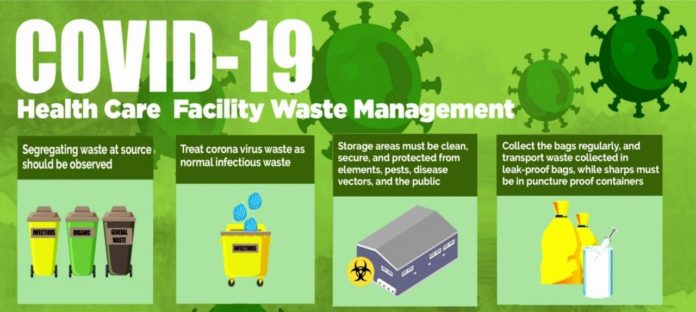Clinical waste is produced because of healthcare activities and needs to be disposed of legally and safely.
Clinical waste must be packaged, handled and collected under controlled conditions and cannot be disposed of with other wastes. There are legally enforced regulations covering every step in the clinical waste management process.
According to The Hazardous Waste (England and Wales) Regulations 2005 and Environmental Protection Act 1990, Clinical waste is defined as “. . . any waste which consists wholly or partly of human or animal tissue, blood or other body fluids, excretions, drugs or other pharmaceutical products, swabs or dressings, syringes, needles or other sharp instruments, being waste which unless rendered safe may prove hazardous to any person coming into contact with it; and b. any other waste arising from medical, nursing, dental, veterinary, pharmaceutical or similar practice, investigation, treatment, care, teaching or research, or the collection of blood for transfusion, being waste which may cause infection to any person coming into contact with it.”
Clinical waste can be divided into three broad groups of materials:
Any healthcare waste which poses a risk of infection (and therefore by definition possesses the hazardous property H9 Infectious);
Certain healthcare wastes which pose a chemical hazard (for example one of H1 to H8, H10 to H15);
Medicines and medicinally contaminated waste containing a pharmaceutically active agent.
Clinical waste must be ‘rendered safe’ to remove the risks that it poses.
As COVID-19 is a new virus, it should be pointed out that there is no established waste treatment process yet for waste generated in response to it. Nonetheless, according to the WHO, any health facility exercising best practices for infectious waste will also be able to manage waste potentially infected with COVID-19. Yet, special attention may still be given to COVID19-related waste such as PPEs by setting up a distinct bin for these types of waste, which then gets double bagged for safe transport. Segregating waste at the source should always be observed.
There is no need to incinerate COVID19-related waste since medical waste autoclaves that use pressurized steam at 30psi at a saturation time of 30 minutes are known to kill any heat-resistant pathogens without need for chemicals whatsoever. A temperature up to 135°C degrees or higher achieves microbial inactivation at a 99.9% kill rate on the most heat-resistant pathogens known to science, including Bacillus Stearothermophilus.
Any PPE that could potentially be reused should be cut to pieces. Cut masks, for example, because there are reports that they are being illicitly resold. Thus, advise every staff to do this to PPEs they individually use before discarding them into appropriate bins.
Because the COVID-19 virus survives briefly in tropical temperatures, as an additional safety measure, it is recommended to label every bag of PPE waste with their collection dates and have them stored in waste holding areas for at least 3 days to ensure that no virus survives in the collected items. See to it that they are in leak-proof, puncture-proof containers, and that storage areas are clean, secure, and protected from the elements, pests, and disease vectors.
(READ: ‘Chronic’ global shortage of virus protective gear ‘urgent threat’ – WHO)
Finally, it can never overemphasise the importance of proper hand washing, especially for hospital personnel handling wastes. Together with appropriate PPEs, washing hands make a formidable defence against the virus. Since we know that the coronavirus that causes COVID-19 is coated in lipids that dissolve in soap, which then result in the complete destruction of the virus, washing hands properly with soap and water remains to be the simplest and most consistent way of preventing the spread of or getting infected by the virus
COVID 19 And The Need To Change Ghana’s Waste Management Systems.COVID 19 And The Need To Change Ghana’s Waste Management Systems.
Author: Philip Kyeremanteng BSc MSc MSEE MCIWEM CEnv
(Senior Environmental Scientist, UK)


